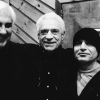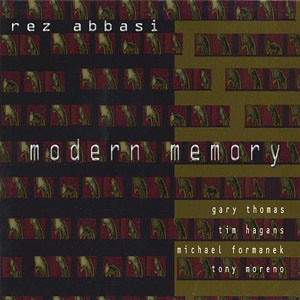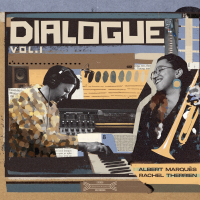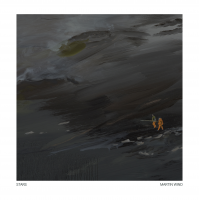Home » Jazz Articles » Album Review » Paradox Trio: Source
Paradox Trio: Source
Relatively few of the tunes are wholly original. Darriau wrote the opener, "Turkic," as well as "Ghost Dance." Shepik wrote the "Honga" portion of "Hora/Honga." The other tracks are either Darriau’s or the group’s arrangements of arcane source material, some of it dating back to recordings made early in this century, some of it dating back much farther. The detailed liner notes prove helpful in sorting it all out. Thus we learn the names of the various forms that typify this music: the terkisher, the kalamatiano, the hora, the ciftetelli, the hassapiko, the doina. Some of it is in waltz time, some in a driving, danceable four. "Wounds" is a slow, mournful 7/8.
"Ozi Vezimrat Ya" is Shepik’s arrangement of a beautiful Yemenite song; Shepik plays saz, a Turkish stringed instrument, while Darriau plays the kaval, an "end-blown Bulgarian shepherd’s flute." The combined sound of these two instruments is remarkable, and Salifoski’s finesse on the dumbek is amply demonstrated. On "Ghost Dance" Shepik plays Bulgarian tambura, a fretless instrument with a vaguely sitar-like sound. "Üsküdar," a Turkish standard from the 20s, features Shepik on electric saz and Lorin Sklamberg of The Klezmatics singing beautifully in the Turkish language. The inclusion of vocals is a first for the group. Other vocal features are "Alts Far Gelt," a lively klezmer with Sklamberg singing in Yiddish, and "Bocet Doina," a hypnotic rubato theme sung by Romanian vocalist Margareta Paslaru.
Instrumental tracks such as "Turkic," "Wounds," "Hora/Honga," and "Oriental Suite" bear more resemblance to the chops-intensive sound of Paradox’s first two records. Angular, fast, exotic melodies are played in unison by horn and guitar. Shepik’s frequent use of fuzztone is a good example of how the group brings West and East provocatively into contact. Cappadocia primarily plays his cello pizzicato, with a sound not unlike an upright bass in the Eddie Gomez mode. Salifoski’s playing ranges from the tasteful, lightly stepping "Üsküdar" to the all-out groove of "Oriental Suite."
Many jazz and fusion musicians have attempted to work with non-Western musical elements, but very few have achieved this kind of authentic synthesis. The Paradox Trio’s overtures to the East are based not on faddish religiosity or empty multicultural posturing, but on thorough knowledge and mastery of the forms with which they’ve chosen to work. The result is entirely unpretentious, and entirely musical.
Cyberhome: www.knittingfactory.com
Personnel
Album information
Title: Source | Year Released: 1999 | Record Label: Knitting Factory
Tags
PREVIOUS / NEXT
Support All About Jazz
 All About Jazz has been a pillar of jazz since 1995, championing it as an art form and, more importantly, supporting the musicians who make it. Our enduring commitment has made "AAJ" one of the most culturally important websites of its kind, read by hundreds of thousands of fans, musicians and industry figures every month.
All About Jazz has been a pillar of jazz since 1995, championing it as an art form and, more importantly, supporting the musicians who make it. Our enduring commitment has made "AAJ" one of the most culturally important websites of its kind, read by hundreds of thousands of fans, musicians and industry figures every month.





















